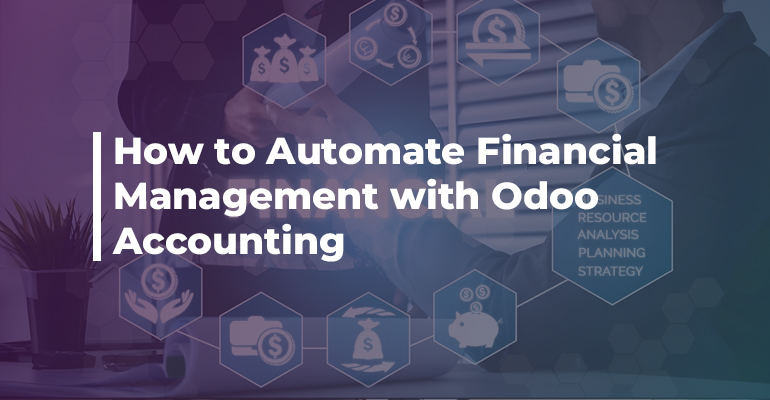
How to Automate Financial Management with Odoo Accounting
Financial management is an important function of any enterprise, facilitating smooth operations, regulatory compliance, and strategic decisions. Historically, enterprises used manual accounting procedures, which were error-prone, wasteful, and time-consuming. Yet, automation has transformed financial management with advances in technology, making it quicker, more accurate, and cheaper. One such powerful solution for automating finances is Odoo Accounting, a modular and integrated ERP system that simplifies accounting processes, enhances efficiency, and increases financial visibility. This essay discusses how Odoo Accounting enables businesses to automate finances, its main features, advantages, implementation difficulties, and best practices for effective implementation.
Overview of Odoo Accounting
Odoo Accounting is an integral part of the larger Odoo ERP collection, meant to automate and streamline financial activities. It provides thorough features like real-time financial reports, automatic bank reconciliation, invoicing, tracking of expenses, tax handling, and compatibility with other business modules like Sales, Inventory, and Human Resources. With its ease of use and customizable dashboard, Odoo Accounting enables firms to access knowledge about their finances while lessening manual labor. Unlike conventional accounting packages, Odoo offers an elastic and extendable solution to accommodate companies across industries and size.
Important Features of Odoo Accounting
Odoo Accounting has an abundance of features that simplify and automate accounting procedures.
- Automated Payment and Invoicing: Odoo facilitates businesses to automatically create invoices from sales orders, contracts, or subscriptions. It supports recurring invoices, payment reminders, and integration with various payment gateways, decreasing the effort for collecting payments.
- Bank Reconciliation: Odoo streamlines bank reconciliation by automatically downloading bank statements and comparing them to respective invoices and payments. The functionality reduces errors and maintains precision in accounting records.
- Expense Management: The system enables employees to file expenses online, which can be automatically processed and reimbursed according to pre-defined policies. This reduces paperwork and accelerates expense tracking.
- Tax Compliance and Management: Odoo calculates taxes automatically according to pre-defined rules and enforces local tax laws. It caters to various tax rates, VAT, and GST processing and simplifies tax filing.
- Financial Reporting and Analytics: The system generates live financial reports, such as balance sheets, profit and loss accounts, and cash flow statements. Companies can personalize reports to better understand finance.
- Multi-Currency and Multi-Company Support: Odoo Accounting accommodates companies with operations in different countries through the ability to conduct transactions in different currencies and consolidate financials across different companies.
- AI-Driven Automation: The platform uses artificial intelligence to forecast financial trends, classify transactions, and make intelligent recommendations for financial decision-making.
Benefits of Automating Financial Management with Odoo
Implementing Odoo Accounting brings numerous benefits to businesses, improving efficiency, accuracy, and strategic planning. Some key advantages include.
- Time and Cost Efficiency: Automation reduces the time spent on manual data entry, reconciliations, and report generation, leading to significant cost savings.
- Error Reduction and Accuracy: Automated processes eliminate human errors in calculations, ensuring financial records are precise and reliable.
- Improved Cash Flow Management: With real-time insights into receivables, payables, and cash flow, businesses can make informed decisions to optimize liquidity and avoid financial bottlenecks.
- Regulatory Compliance: Odoo Accounting ensures businesses comply with tax regulations, audit requirements, and financial reporting standards, minimizing legal risks.
- Enhanced Security and Data Integrity: The system maintains secure financial records with access controls, audit trails, and backup mechanisms, reducing the risk of fraud and data loss.
- Scalability and Customization: Odoo is scalable to meet the increasing demands of businesses and can be customized according to individual industry needs.
Challenges in Implementing Odoo Accounting
Though Odoo Accounting has immense advantages, businesses might encounter issues during the implementation process, including.
- Initial Setup and Configuration: Configuring Odoo to correspond to business processes involves technical knowledge and meticulous planning.
- Integration with Existing Systems: Companies with older accounting software might find data migration and integration with systems challenging.
- User Adoption and Training: Employees might resist the switch to an automated system because of unfamiliarity. Successful adoption will require proper training and support.
- Cost Considerations: Although Odoo is cost-effective, businesses must factor in implementation, customization, and maintenance expenses.
- Regulatory Compliance Challenges: Configuring Odoo Accounting to comply with particular local financial and tax laws requires extra setup and updates.
Best Practices for Successful Adoption
In order to have a successful transition to Odoo Accounting, companies must observe best practices such as.
- Running a Financial Needs Analysis: Determining key accounting issues and business needs aids in the proper tailoring of Odoo.
- Involving Stakeholders Early: Getting the finance teams, IT specialists, and decision-makers involved early on in the implementation process guarantees organizational goal alignment.
- Offering Extensive Training: Organizing workshops and hands-on training for staff members ensures that they learn and make proper use of the system.
- Proper Migration of Data: Accurate financial data migration from existing systems to Odoo is important to keep everything consistent and compliant.
- Regular System Updates and Maintenance: Keeping Odoo Accounting current with new features and security patches improves performance and reliability.
Automating accounting with Odoo Accounting provides companies with a strong tool to automate processes, increase accuracy, and enhance decision-making. With its strong features, scalability, and integration, Odoo enables organizations to move away from conventional accounting practices to a more efficient and data-driven method. Although there are challenges in implementation, embracing best practices and utilizing expert assistance can guarantee a smooth and successful transition. As companies continue to develop, financial management automation will be a vital aspect of ensuring competitiveness and realizing sustainable growth. Unlock the full potential of your ERP system with proven Odoo ERP optimization strategies that enhance performance, streamline workflows, and drive business efficiency.